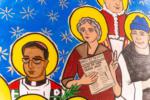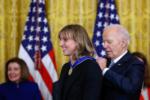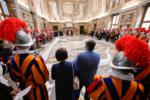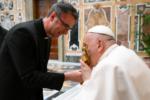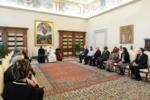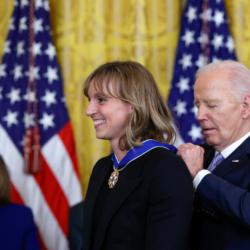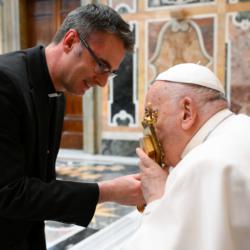Synod15: Press Briefing Oct. 6th
Vatican City State (ZENIT) --
'There must be an end to exclusionary language and a strong emphasis on embracing reality as it is. We should not be afraid of new and complex situations.'
These were words of Basilian Father Thomas Rosica, the Vatican's English speaking language spokesperson,this afternoon who was speaking at the briefing of the Synod's second day in theVatican press office, with its director, Father Federico Lombardi, Italian Archbishop Claudio Celli, and Canadian Cardinal Paul-AndreDurocher.
The Oct. 4-25 meeting is being held on the topic "The vocation and mission of the family in the Church and the contemporary world."
When giving English speaking journalists an overview of what's taken place since yesterday's press office briefing, Fr. Rosica sharedthatPope Francis gave a short discourse this morning to the synod fathers and delegates following one given byCardinal Baldisseri, who realizing many of those present this year had not been last year,explained to them the importance of working in the small groupsand speak freely.
Pope Francis, Fr. Rosica reminded those gathered of the three official documents,points of reference, from the lastsynod: his opening words, the first day last year in October, his closingdiscourse on Oct. 18, and the Relatio Synodi which was released at the end. Fr. Rosica also mentioned how the Popealso suggested thatthis synod and the one last year are in total continuity with one another.
The Holy Father stressed that discussing thequestion of giving communion to the divorced and remarried is not the theme of the synod, but one of many important priorities. The spokesman said the Pope's address was very brief, but very positive andencouraging, especially for those therefor the first time.
Fr. Rosicagave some initialobservations. First of all the brevity of the interventions has helped foster clarity of expression. "If you can't say it in three minutes, then you can't say it. And the three minutes have been very productive. They say what they want to say," he said.
Second, the family is the protagonist of the new evangelization and the main actor in renewing the sacrament of marriage as the family.Thirdly, the role of the priest is indispensable, especially with helping couples, and given this, his own formation is especially important.
Aiming to summarize the some 70interventions given mostly inItalian, English and French as well as in Spanish, German and Portuguese, Fr. Rosica said the issues of migration, poverty, employment, war, and the major refugee problem and how to best react these challengeswere greatly considered.Other issues brought up, he noted, including domesticviolence, violence in the Church, andsexual abuse.
Regarding the idea of divorced remarried Catholics being able to receive communion, he noted how some assert it wouldbe more difficult to come up with a universal response, but instead makes sense to come up witha regional treatment. He said it may make sense to examine and perhaps treatthe situation on a more local, regional, even continental level.
Certain other issues, he also shared may also make sense to consider locally, such as polygamy.
The importance of changing language used to address certain difficult situations, Fr. Rosica said, was highlighted. "The language must be renewed," he said, noting how this is especially appropriate and linked to the Extraordinary Jubilee Year of Mercy which Pope Francis has declared, Dec.8, 2015 - Nov. 20, 2015."The Jubilee of Mercy requires a language of mercy," he said. Father Rosica underscored how languageought to always be inclusive, rather than exclusive, particularly for homosexuals.
"In particular, when speaking about homosexuals or gay persons," he said, "we recognize them for who they are: They are our sons, our daughters, and brothers,sisters, neighbors and colleagues."
He noted how many expressed how a pastoral approach is needed for couples living together, to welcome and help them move forward toward a fulfilling married life, one which says: "Look, God loves you as and where you are, but God doesn't want you to stay there. He wants you to go further."
A common suggestion of the delegates, he noted, was not only for greater preparation before entering into marriage,but continues into its early stagesto help couples adapt to their lives as spouses.
Moreover, the synod fathers and delegates spoke about the role and treatment of the elderly was underscored, especially for their importance in transmitting the faith and values with in families.

